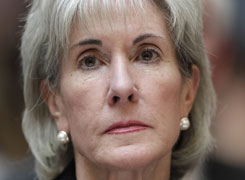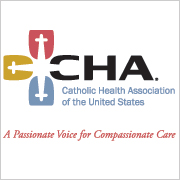And just in the nick of time. They were headed for a lee shore, or so it seemed back in February. That is when Sister Carol Keehan had backed the Administrations “Accommodation,” standing side by side with Vice-President Joe Biden making her announcement to that effect. But it appears that she, and the group of hospitals she leads, has had a change of heart. Prayers are being answered!
Today, the Catholic Health Association sent the Administration notice that they have changed their minds about the HHS Mandate. Why? Because of the threat it poses to religious liberty. In a five page letter written by Marilyn Tavenner, Acting Administrator of the Association, the CHA outlines their concerns present in the current, and inflexible, stance the Administration has taken. What follows starts on page 3 of the letter,
The final rule released on February 10, 2012 implemented the narrow religious exemption as proposed, but also indicated the Administration’s intent to propose additional rules to implement the contraceptive coverage requirement in a way that would accommodate the concerns of nonexempt religious employers with objections to providing, paying for or referring for contraceptive coverage. While this new development seemed at the time to be a good first step, our examination and study of the proposal as outlined then and in the ANPRM has not relieved our initial concerns. Accordingly, for the reasons set forth below, we continue to believe that it is imperative for the Administration to abandon the narrow definition of “religious employer” and instead use an expanded definition to exempt from the contraceptive mandate not only churches, but also Catholic hospitals, health care organizations and other ministries of the Church ( As the representative of Catholic hospitals and health care providers, which will be impacted in their role as employers, CHA focuses its comments on this aspect of the APRNM. We acknowledge, but will not address here the issues about whether the mandate itself is constitutional and whether it should apply to other entities, such as, insurers or individuals. The United States Conference of Catholic Bishops has persuasively addresses these points it its comment letter).
If the government continues to pursue the policy that all employees should have access to contraceptive services, then it should find a way to provide and pay for these services directly without requiring any direct or indirect involvement of “religious employers,” as broadly defined.
The Definition Of “Religious Employer” Must Be Broadened To Cover All Ministries Of The Church.
The Departments state in the ANPRM the two goals they seek to achieve:
* To maintain the provision of contraceptive coverage without cost sharing to individuals who receive coverage through non-exempt, non-profit religious organizations with religious objections to contraceptive coverage in the simplest way possible, and
* To protect such religious organizations from having to contract, arrange or pay for contraceptive coverage.
The most effective way to achieve the Departments’ second stated goal would be to actually exempt objecting religious organizations from the mandate by expanding the definition of religious employer to include them. This approach would align the policy under the women’s preventive care regulation with existing federal law on conscience protection. The exemption in the final rule is narrower than any conscience clause ever enacted in federal law and reflects an unacceptable change in federal policy regarding religious beliefs.
The ANPRM suggests that Code Section 414 could provide the basis for a definition of the organizations that would quality for the proposed accommodation. We reiterate our suggestion contained in our September 22nd letter that the concepts contained in Section 414(e) be used instead to develop a broader and more appropriate religious employer exemption to the contraceptive mandate.3 Under those principles, an organization would be covered by the exemption if it “shares common religious bonds and convictions with a church.” This definition would exempt from the contraceptive mandate Catholic hospitals and health care organizations as well as other ministries of the Church.
The CHA has even drafted language that could be used to clear the water on this issue. Download all 5 pages here.
I’m guessing the Secretary of HHS is thrilled about this development.

Then again, maybe not. Looks like we have our turn with a late Friday afternoon “data dump.” The Washington Post notes that,
The Catholic Health Association was a key ally in Obama’s health care overhaul, defying opposition from church bishops to help the president win approval in Congress. But the group said Friday it does not believe church-affiliated employers should have to provide birth control as a free preventive service, as the law now requires.
The hospital group’s decision calls into question a compromise offered by the president himself only months ago, under which the cost of providing birth control would be covered by insurance companies and not religious employers. While churches and other places of worship are exempt from the birth control mandate, nonprofits affiliated with a religion, such as hospitals, are not.
It’s fitting, in a way, that the CHA’s change of heart is announced on the Solemnity of the Most Sacred Heart of Jesus. Don’t you think?
UPDATES:
Deacon Greg
The Anchoress
Jimmy Akin
Commonweal
American Thinker

















